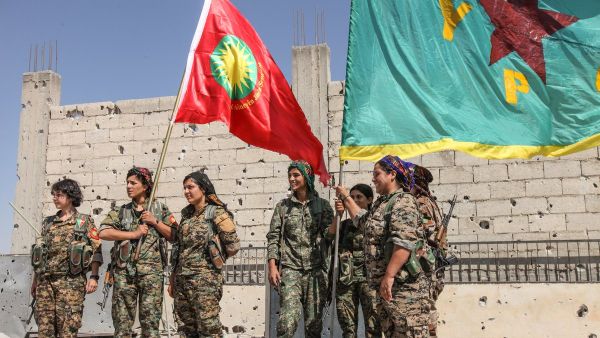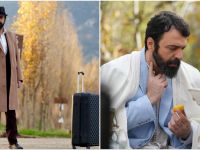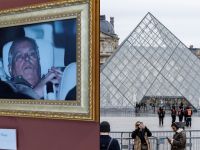- Kurdish militias such as the YPG are often portrayed as liberal hero by Western media outlets.
- However, the groups face a number of abuse allegations against displaced Arab and Kurdish citizens.
- The YPG is also accused of using child soldiers despite pledges to end the practice.
Many displaced citizens have had their documents seized and are being held in SDF-run camps.
In Western media outlets, we are all too often given a hero vs villain narrative. This is especially true in the conflict between ISIS and the Syrian Democratic forces, known as the SDF.
The SDF, which is made up of around 30% of Kurdish troops. The YPG, also known as The People’s Protection Brigades, and the YPJ, the group’s all-female counterpart, regularly feature in foreign media outlets, famed for their for their feminist attitudes and liberal ideals.
The group also made headlines in recent months after it emerged that they were fighting alongside an LGBT battalion within a group of international leftist Anarchists.
Indeed, the conflict has also attracted volunteers from abroad in the same vein of the international socialists who volunteered to fight fascism during the Spanish Civil War.
The message is clear from the international press - The SDF are definitely the heroes of the day.
However, few mention that the group also stands accused of a number of crimes during their takeover of ISIS territory.
The activist group, Raqqa is Being Silently Slaughtered also accused SDF forces of killing civilians in July this year.
Speaking about the incident, the anonymous group posted: “On this evening, civilian Asa’ad Ahmed Zieno left his home with the intent of bringing water back from one of the neighborhood’s wells. On his way, Asa’ad saw the SDF militants and thought they were ISIS fighters, so he went back into his home. The armed group then proceeded to throw a grenade at the door of Asa’ad’s house.
Asa’ad went out to see what was happening, so the armed group immediately shot and killed him. His father then also went out to see what was happening, and the group subsequently shot and killed him as well. The SDF militants videotaped the crime – documenting the last moments of these victims.”
The group is known for its stance against both ISIS and the Syrian regime and is viewed by many as an objective source of news from inside the Syrian city.
The group is also accused by the activist group of killing scores of civilians in villages to the North of the city. Meanwhile, it is alleged that the Kurdish forces banned Arabs from entering the area Tel Abyad unless they have a Kurdish sponsor.
One commentator from inside the city posted: “The international community is launching a military campaign to eliminate the terrorist group ISIS, but who is coming after? A no less terrorists! (sic) You cannot replace a terror with a no less terror.”
However, these aren’t the only concerns about the SDF forces.

The TQILA LGBT fighters group made headlines earlier this year (Twitter)
While many outlets were keen to report the presence of the TQILA LGBT battalion. It made front-page news in far fewer places when the group along with their Anarchist comrades were removed from frontline duty just hours after the story went viral worldwide. The SDF also released a statement denying the existence of an LGBT battalion within its ranks.
The US State Department also found evidence that the YPG was using child soldiers as young as 12, often without their parent's consent, in a report released earlier this year.
This comes despite an earlier pledge by the group, not to use persons under 18 on the battlefield.
In October 2016, a YPG spokesperson told Human Rights Watch that child recruitment had gone down “to a minimum” and that children were not fighting on the front lines.
In 2015, Amnesty International also accused Kurdish groups of war crimes after it found evidence of forced displacement and home demolitions by Kurdish troops.
Lama Fakih, then Senior Crisis Advisor at Amnesty International said: “By deliberately demolishing civilian homes, in some cases razing and burning entire villages, displacing their inhabitants with no justifiable military grounds, the Autonomous Administration is abusing its authority and brazenly flouting the international humanitarian law, in attacks that amount to war crimes.”
However, the YPG and later the U.N. later claimed that displacements were done out of “military necessity” rather than ethnic cleansing.
“Though allegations of ‘ethnic cleansing’ continued to be received during the period under review, the Commission found no evidence to substantiate claims that YPG or SDF forces ever targeted Arab communities on the basis of ethnicity, nor that YPG cantonal authorities systematically sought to change the demographic composition of territories under their control through the commission of violations directed against any particular ethnic group,” reads a U.N. report on the matter.

Kurdish YPG troops stand accused of abuse (AFP)
Meanwhile, the United Nations Office for the Coordination of Humanitarian Affairs (OCHA) also found that Kurdish authorities had confiscated ID documents from displaced persons and effectively held them prisoner in SDF-run camps.
People within the camps are allowed to leave if they have a sponsor.
The same body found that Kurdish authorities were refusing to allow displaced people to return to towns such as Tell Abyad, Ayn Arous, and Kobane and that their identity documents had been confiscated at checkpoints if they tried to go to the towns.
The report said: “Restrictions on freedom of movement, as shown by the situation in Mabrouka and Ein Issa, continue to be of concern. Some 3,500 families had reportedly been using their cars as shelter outside Ein Issa camp waiting for the authorities to return their identity documents.”
It is also claimed that SDF troops took communication devices from persons at the camp.
Questions have also been raised about the procedures used by SDF troops when vetting displaced peoples for ISIS militants. Many families claim that male relatives who fought with other groups such as the Free Syrian Army have been held by SDF forces without access to a lawyer for long periods of time after being accused of fighting with the terror group.
While many outlets around the world try to paint the Kurdish forces as a group of liberal freedom fighters, it appears that the real picture is far more complicated.







